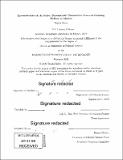Intermediaries of the state : bureaucratic transaction costs of claiming welfare in Mexico
Author(s)
Rizzo, Tesalia (Tesalia Elisa Rizzo Reyes)
Download1293026931-MIT.pdf (18.25Mb)
Other Contributors
Massachusetts Institute of Technology. Department of Political Science.
Advisor
Lily L Tsai.
Terms of use
Metadata
Show full item recordAbstract
This dissertation argues that the existence of bureaucratic transaction costs hinders individuals' pursuit of welfare benefits Instead, these costs make individuals dependent on intermediaries of the state who facilitate access to benefits Intermediaries range from street-level bureaucrats or social workers to political bosses, brokers or caciques However, in institutionally weak contexts, intermediaries will often demand political loyalty in return for their assistance, a practice better known as clientelism If chentelist intermediaries mediate citizens' engagement with the state, then claiming welfare benefits does not enhance citizenship and produce stakeholders, as research on the welfare state in developed country contexts suggests, but rather intensifies political loyalties to intermediaries This democratic penalty, although most prevalent in economically developing countries, is not exclusive to the poor Mediated interactions with the state perpetuate pre-existing skill deficits, with adverse consequences for individuals' sense of self-efficacy, political autonomy, and capacity to hold governments accountable Alongside more than 100 in-depth interviews with citizens, intermediaries, politicians, and bureaucrats, obtained during 13 months of fieldwork, I test this argument through a large-scale field experiment in rural Mexico The experimental results reveal that reducing the bureaucratic transaction costs increases the number of claims made through non-chentelist avenues The experimental intervention also weakened the belief that welfare entitlements must be reciprocated with political support and diminished general approval of quid pro quo exchanges, two key norms that sustain clientelism. Although intermediaries may be efficient deliverers of benefits and may even compensate for deficiencies in state capacity, this dissertation maintains that mediated avenues of distribution can have detrimental effects on building citizens' bureaucratic skills, autonomous political participation, and the ability to reliably make policy demands on the state However, my results demonstrate that the vicious cycle of mediation can be broken by reducing the costs that citizens face in obtaining welfare benefits directly from the state.
Description
Thesis: Ph. D., Massachusetts Institute of Technology, Department of Political Science, February, 2020 Cataloged from the official PDF version of thesis. Includes bibliographical references (pages 185-200).
Date issued
2020Department
Massachusetts Institute of Technology. Department of Political SciencePublisher
Massachusetts Institute of Technology
Keywords
Political Science.